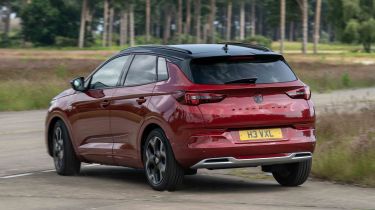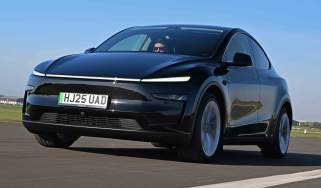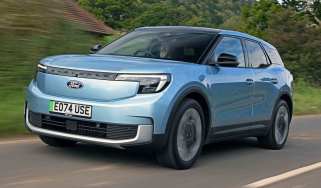Vauxhall Grandland (2017-2024) - MPG, CO2 and running costs
The Vauxhall Grandland Hybrid is more efficient than the regular petrol, but it’s more expensive to buy and insure

Just so you know, this is an older review of the 2017-2024 Vauxhall Grandland. If you are interested in information about the running costs of the latest Vauxhall Grandland, or news of upcoming Vauxhall models, please follow the links provided.
Go for a Vauxhall Grandland powered by the 128bhp 1.2-litre turbo petrol, and the manual version has a claimed economy figure of 46.3mpg and CO2 emissions of 137g/km, while adding the optional automatic gearbox results in a slight dip to 44.1mpg and emissions of 144g/km. When we drove the Grandland with this engine and the automatic gearbox, it struggled to achieve its official mpg figure, only managing 39.1mpg.
The Hybrid version is much better, with fuel economy of 51.3mpg and emissions of 124g/km. During our Hyundai Tucson vs Ford Kuga vs Vauxhall Grandland group test, the Grandland Hybrid managed an impressive 46.2mpg.
Company car drivers will need to look towards plug-in hybrid rivals such as the Ford Kuga and Hyundai Tucson after the demise of the plug-in hybrid Grandland, or wait until the all-electric version of the upcoming new Vauxhall Grandland arrives, later in 2024.
Insurance groups
Vauxhall Grandland insurance groups are pretty competitive: the entry-level 128bhp 1.2 in group 17 while the 134bhp Hybrid is in group 20. That’s on a par with the Ford Kuga and Hyundai Tucson, which both start in group 16, before rising to groups 19 and 20, respectively, for the equivalent hybrid versions.
Depreciation
Our data suggests that the Vauxhall Grandland should hold onto 46 per cent of its value over a typical three-year/36,000-mile ownership period. That’s a little behind the Ford Kuga that’s predicted to maintain 52 per cent over the same period.
To get an accurate valuation on a specific model check out our free car valuation tool






